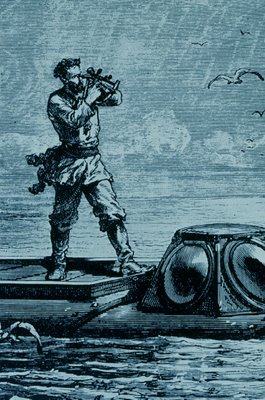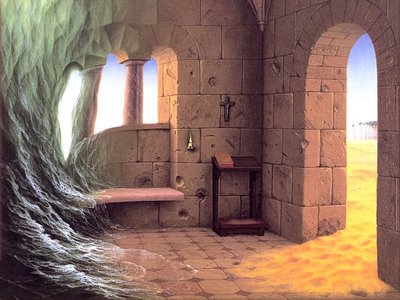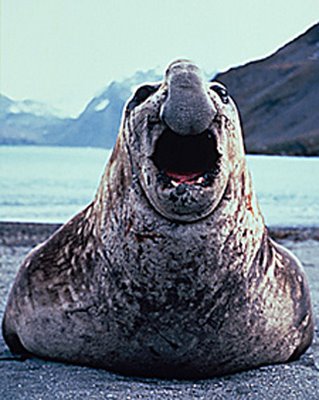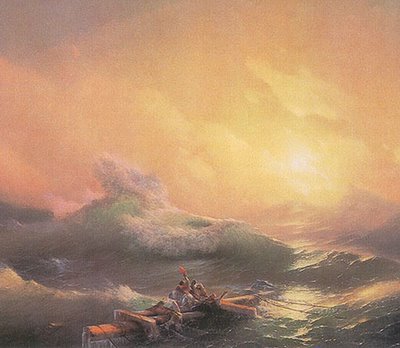
From Rachel Carson's
The Sea Around Us:
As the hidden lands beneath the sea become better known, there recurs again and again the query: can the submerged masses of the undersea mountains be linked with the famed “lost continents”? Shadowy and insubstantial as are the accounts of all such legendary lands -- the fabled Lemuria of the Indian Ocean, St. Brendan’s Island, the lost Atlantis -- they persistently recur like some deeply rooted racial memory in the folklore of many parts of the world.
Best known is Atlantis, which according to Plato’s account was a large island or continent beyond the Pillars of Hercules. Atlantis was the home of a warlike people ruled by powerful kings who made frequent attacks upon the mainlands of Africa and Europe, and finally attacked Athens. However, “with great earthquakes and inundations, in a single day and one fatal night, all who had been warriors {against Greece} were swallowed up. The Island of Atlantis disappeared beneath the sea. Since that time the sea in those quarters has become unnavigable; vessels cannot pass there because of the sands which extend over the site of the buried isle.”
The Atlantis legend has lived on through the centuries. As men become bold enough to sail out on the Atlantis, to cross it, and later to investigate its depths, they speculated about the location of the lost land. Various Atlantic islands have been said to be the remains of a land mass once more extensive. The lonely, wave-washed rocks of St. Paul, perhaps more than any other, have been identified as the remains of Atlantis. During the past century, as the extent of the Atlantic Ridge became better known, speculations were often centered upon this great mass, far below the surface of the ocean.
Unfortunately for these picturesque imaginings, if the Ridge was ever exposed, it must have been a long time before there were men to populate such an Atlantis. Some of the cores taken from the Ridge show a continuous series of sediments typical of ocean oceans, far from land, running back to a period some 60 million years ago. And man, even the most primitive type, has appeared only within the past million years.
 SEA HEART
SEA HEARTAugust 19
Perhaps I so sing the sea
because its fundament
tides too deep in me, a
wash of sheer true
blue salinity. My
heart’s music is
a pickle of that sea,
hurling blood to polar
‘'burbs of toes and nose
and back in an essential
exultant pulse,
spasming out the
sea’s receipt,
wombing what returns
in major minor thirds.
The heart of this
matter’s dark, hidden
behind the ribs of
the whale who swims
top to bottom in a
single breath, scaling
hell to heaven’s breadth
in one breech and ebb.
Oh the flukes which
pound in my chest
for the naked testament,
God’s sheer immensity
in those undulant curves
beneath the lace and
satin naughtiness, eyes
of Persephone inside
welcoming thighs
for the Poseidon of
my plunder, as needy
for my hot blue psalms
as I am to fling ‘em
in jots of God-gout fire.
When I read of the sea
I sense my soul’s topography,
drowned down beneath
aged eyes which sail
days in solar, too-bright ways;
the sea is shaped like my
inside brain, the root half
of the tree as equal in
immensity in obverse dark,
peopled with precedent
and totem ancestors --
schools of Jung and
Rilke, mantas wide
as Shakespeare, the Heraclitean
eel fanning over substratum
daddies to far down and
deep and dark to recall
much of a name. The
sea’s abysm is their
darkness on my tongue,
succinct in all I fail to say --
lacunae of the green
lagoon, yawning chasms
of first thought which
lifted in the brains
of us that first
instant off the sea’s nipple
which shaped isolation’s
drool steeple tolling all
the names of what
we lose. Isolde bells
inside the balls I
clabber with bronze peen,
hurtfully clamoring
for the forever fading
view of her upon that beach
no real waves ever reach,
much less cream in
spermatazoic foam.
A singsong nursery fonts
sea water in my brain,
delighting in the trains
of waves which rhymes that
brilliant white shore
of summery orizons,
minting gold from fakey
ores hauled in from
imagined horizons
far sweeter than I
will ever see with these
mortal, moderned eyes.
The sea is the end
of every ecstasy,
my river’s homeward
organum, pouring
lavish down the
pages to hear that
surf’s hurled boom
and ebbing swash
fro which all bliss
is inextricable from
the nature of its loam.
Sea-water, heart’s blood,
blue motions both
eternal, my ever tiding
hand in the chambers
of the heart which
first beat in the sea.
My sea-borne heart
ferries this keeled
casket of a song
directly home to Thee,
sweet master, breasty
ululant of summer
days at the shore
I woke upon when
love poured volumes
into me with just
a fading kiss
and then bid me write
it all back down
till every league
was sounded, till
every wave is rounded
rolled careened & smashed
full here, and all the wild
waters of the heart have
foamed and hissed
and held for this moment
in a perfect caesura of
stilled silence which
is ever the umbilicus
between blue you and I
which no verbs can
measure nor name
final enough may cut
though every sea
will one day dry
and the music from
this mouth will die.
 SONG OF THE STRAND
SONG OF THE STRANDMy song is a merman
bereaved of his scales
sitting on a rock
between his sea and
this world we call our own.
He’s crying low
in a sweet-salted voice
for Swinburne’s tides
on a Joycean beach.
For him this pale page
so raw at first light
is hardly a vantage,
for he can dive
three miles down
on the back of a whale
and when Leviathan
falls no further, bid adieu,
and leap all the the way
down beneath abyss
to a merry world
where coral bungalows
are the teeth of
Tiamat’s split jaw.
-- Lost to him now,
my ancient brine captive,
who now lives in this hand
walking a pale white sand,
singing of low mansions
to the ear’s desperate strand.
COLD SONGDec. 2003
This song is hauled up from a cold well
Nearby -- Oran’s, I sense, though
His skull is just the topmost phosphor
In the darkened flow. From this chair
In sleepy Florida I taste
The salt of Hebrides -- brutal,
Male, like iron on the tongue, wild
As the huge rollers which smash
The Orkney coast. I tried this sea-
Chantey strapped to a guitar, but
The roar would not be amped or staged
or spermed in nereid blue. All
that puerile wattage drowned the song.
I threw my guitar down a well.
Oran sings from that falling shell.
 SONG TO LIR
SONG TO LIR2005
I’m still in thrall with those bad
old nights. Black fiddles still
saw swoony and fey that
big night music in my reverie;
something lurches when I
recall the thrill of driving headlong
into the darkest rooks of town,
scenting something blonde and
bloodlike in the night breeze rushing
through the opened windows
of my car, the ions of summer
storm and surf igniting my
neural ramparts, like St. Elmo’s
Fire, with the eerie wattage
of danger and booze and sex.
That blue alchemy was the
quintessence of my Faustian
dive into LaLaLand, pouring
myself in votive jolting jets
down into the badassed
veld of all Black Mothers.
Certainly all that is
nothing to fall too much in
love with again, else I fall again
in all those hurtful ways.
Yet in that gnarly bad-booze
brew a crystal bed lay far
down out of view; at the heart
of those dark quests lay the
the hope of finding once again that
bright grail of clear blue love
which in all the years of
roaming and ravening I had
blundered on two or three
too-brief essential times,
each a milky pure enactment
which washed me more
cleaner of my arrears
than when I was baptized in the
sea at Melbourne Beach
when puberty shot me forth.
Perhaps that soft-glo bed
of Perfect Love was just the
golden carrot of a darker
more selfish appetite for More;
I certainly crept out of
far too many beds
at the far ends of those nights
believing Love -- the free-fall,
lucky type -- was nowhere
on that rumpled snoring shore.
All that is true, but these
days another thought begins
to form that the whole of that
gambol between savage lust
and starry love was just the
foolish half I too much believed,
meant by godlike hands whose
ends were mine, as if
my enbrined sense could drink
a goddess night to dregs.
A Puritan error I have so many
drowned fathers to thank, I think.
I come to sense now that while
I dissembled like an Actaon on
down those bad years, ever more
mauled and shredded by my own howls
for love in a wilderness of rock taverns
and boob bars and and bottle clubs,
some darker underside was nursing
from me, not so much from my acts
but the desires which teated them,
growing more visible as a
shape defined up from an
enormous sea which is the greatest
part of me, a whale which grazed
upon on my yearning midnight stare.
While I banged on to ruinous ends
it lurched and followed, devouring
every whiskey bottle, bra and guitar
pick I flung over a shoulder toward
forgetfulness, each a wafer of communion
which slowly woke his soul in mine,
night after night, acre after fathom
of that watery abyss. And then one
night I found us somehow one,
my slipping & sliding & oh so
wounded feet astride his hoary back.
Back then the endless drinking felt
like I had fallen in the whale,
but now I sense that I had just
found a footing there where falling
is the precipice of everything
desire bid me lose. Weirdly too
I sense I’ve yet to hit the real
bottom of that sea, years now
after the last bad boozing night.
There were years in which I
boarded up against all beams
of wet wild night; then years of
reparation for the guilt and shame
by living well and deep. There came
hard education where I learned
that love could not become itself
till I forsook all hope of pouring
it its perfection from a bottle,
babe, and bed. Amid all that
I felt him there, dangerous and
wild, a dark layer of endless
ache which no prayer could
fleece or flay. Now I sense I’m
simply heading deeper as the
two of us swim on. I think
of those old nights and,
with no actual desire to lose
myself in them again, sigh and
swish the liquor of it here,
feasting with stained chops
upon its taste of endlessness,
hauling on huge nipples of
forever-sweeter more, invoking
that blackout in the beast
which parks me on the shore
of Paradise. Yes -- oh feel that
dark immensity lurch deep
within, free and feral in the
deepest nacre of the thrall,
cresting a huge wave in a shower
of moon silver to spume spermatic
fire defiant toward the sky,
crashing down with all the massy
freight of an old, emphatic joy.
And that is just the surface part,
for he dives deeper than what
sight I’ve learned to toss. The limbic
sea he swims on down and back
I will never fully sound, much
know how many million years
he thrusts and fins the verbs.
I’m writing here truly as I’m
riding him, a silly dram
of wakeful ocean on a course
of endless waves, boy cupid
with this tiny flute astride
the night’s Leviathan.
Carve me on the upmost
arch of his coat of arms. Hang
us on the headboard of every
bed I’ve held a woman in.
Carve us on the gravestone
where at last I’m fully wed.
And to every savage fantasy
I hold like whiskey on my tongue,
may his loll like the clabber
which all night bells are rung.
 WHALE SONG
WHALE SONG2004
Sometimes the song
that guides my hand
arrives from
way below,
down where the blue
whale swims, his voice
the deepest register
sea’s brine organum.
His voice under mine
is terrible, the angel
of Jonah and Ahab
who demands more than
short mornings here afford.
It is brutal and cold like
plainsong in my father’s
stone chapel at the
winter solstice, and yet
agelessly sweet like a
blue piano’s kiss.
Such sounds hold in words
only vaguely and at
great cost. I would have
that music pass over me
sitting here in my life
with my wife upstairs asleep
and our cat drinking in
the night air of an opened
window: And yet
such trebles shine
because of his bass clef,
each note of merry
surface bliss
resounding in those
deepest tones which
swim only with the whales,
hurling Thor’s chords
down a thousand-
fathom trench. Poems
inked there drown
their makers, so beware.
Labor carefully
at the organ-pipes
of that lumbering whale.
Go shore to shore
on the highest wings
of his dark hell-booming bell.
 LOVE SONG
LOVE SONG2004
Before Hurricane JeanneBetween I and Thou
in the woods and glades
I cannot know
much less sustain
there’s an echo of
Pan-pipes, reedy wet
and high, strange
as every first peramble
into rude terrain:
A song which sighs
I Love You in the air
where you are gone
yet everywhere,
into the hushed lawns
and stormtossed oaks,
the garden just outside
drowned in dark
at this hour long
before first light.
The soft breeze
through the window
is like your breath
in sleep, the intimate
fusions of a far
and unseen surf’s
curve and crash,
tiding perhaps this
small town’s dreams.
My companion to these
lines is neither God
nor you (though surely
both house me here
today and in this life)
but that inside sound
the late night makes
as I sit here
writing down the notes
and stops of a song
which leads me out
down sleepy streets
into a blackened wood
and blacker pools
drummed with starry pelts
and all the women
my life has seen
are dancing round a
stone engraved with
all the fish and coils and
cups I’ve named or
at least loosened here.
Such a strange high
music just outside
the window, prompting
me to egress frar from
where I thought this
poem would go,
the god I thought to
name. Here is where
ends gather and fall
together in a crush
of sweet black grapes:
ah, but whose lips
are glistening with
the juice of our first
kiss? Whose throat
has swallowed whole
this poem which I
brewed from that
bliss? And where
does that sigh I’ll
never fully name
come from, just
when I here end --
Failed words? Her
sleep? That echo
of a dream the
night dances on
with so soft, so
evananescent a breeze
coming from a distant
slowly approaching storm?
THE SONG
HEALS THE SINGER2005
December 1973: I’m 16 and walking
home from school and work through
New Town on a late afternoon that’s
frozen in the old Chicago way, by
a ferocity more certain in its
hard blue curtaining than death.
The cold seems freighted directly
from the North Pole as I hug
my peacoat tight, hands jammed into
its pockets, a cigarette in my lips
with its tiny bead of fire like a single
orange life-vest lost in a towering
Arctic sea. When I turn right at Fullerton
the wind slaps at me hard like a wolf-
pack sprung with red joy; it mauls and
tears to free the last of heat from me
which I try to shield like a throat.
The light to the west is minted from those
canines, an angry red leaping high at blue
then blacker truths. I could die out here
and no one would care nor even notice
amid the city’s grey decrepitude which
devours whole whatever morsels its
battered citizens provide by failing and
falling hard. Not that much awaits me
at home a few blocks further on, my parents
imploding into an unspoken doom, the
eyes of my siblings too bright with
rage and fear, even the dogs yapping
hysterically at every next wrong sound
coming off the street ten feet from our
front door, sounds we hear and pray
only the safest registers of. I’m walking
there anyway, because where else would
a boy-man like me go? It’s all ending
in the brutal precis of a winter afternoon
very close to the dead end of my sixteenth
year: So why am I just then hearing
Billy Paul’s “Me And Mrs. Jones” in my head?
That sappy Philly soul tune played on
so sweet and tender despite ghetto
arrears which freezes every bud to
stillness on the stem, dooming me
in the end. Stolen love and fragile dreams
which cannot survive another day --
that’s the hottest and most eternal
shaman-puerile flame, and it kept me
walking happily bittersweet on that day
& in fixed in my memory every since,
above the miseries of being 16
in the maul of a Chicago winter, with
neither Jesus nor any bottle of sufficient
proof to poof those dogs away. Like
a choirboy I sang along with that
divine song in my head, thus getting
all of that sweet stuff too. My ears were
burning ice but I still heard the song;
my hands were numb yet ached
to hold my guitar once again; my heart
was empty of any lover’s smile but
was alight on Mrs. Jones smile in that
sad cafe, holding her hand, making up plans.
I burned to write and sing what warmed
that frozen city playing from every
radio and juke in town, creating a music
of my own that boated me spoon-fashion
to that song away from that hard afternoon
down some moony river to this pre-dawn
sub-tropic middle-aging swoon.
I’m still singing bluesy love back
in the face of hard-fought days: Florida
and marriage and a switch from pick
to pen have changed perhaps the singer
but not at all the song; it’s still the
soundtrack of all walks through arctic
fields, delighted to see her once again
albeit in the northern lights of my
conceit splashed upon the page;
thrilled the way she loves me too,
dancing there inside the frozen world
slow and sweetly over all the bones
fallen to the bottom of a life. “Me
And Mrs. Jones” is still in my ear
and I’m still walking that cold road home,
singing along with Your song’s mojo
and singing back my own songs,
getting to every healing inside of
what it means to Get the Girl,
even when love is nowhere to
be found or flung, even when it
freezes to hard ice. Dante harrowed
hell wrappeda in the meters of his song,
the whole passage down the way he
found that heart where Beatrice
waited for him. Whatever I hummed
as a baby I’m still trying to sing here,
her kiss the welcome of each page
I stain in sea-wrack and foam,
still trying to walk those last blocks home.





















